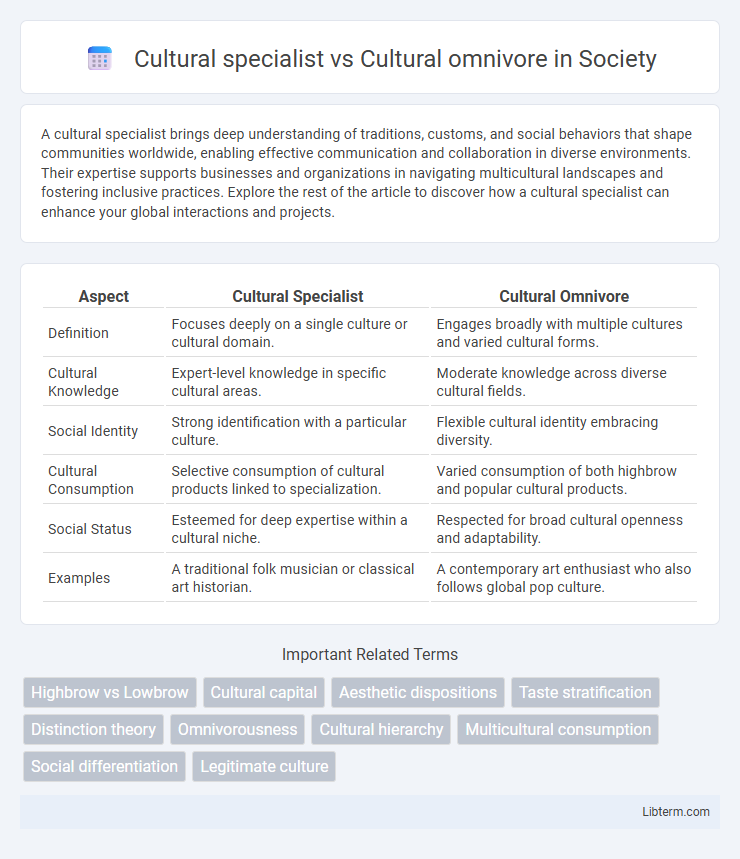A cultural specialist brings deep understanding of traditions, customs, and social behaviors that shape communities worldwide, enabling effective communication and collaboration in diverse environments. Their expertise supports businesses and organizations in navigating multicultural landscapes and fostering inclusive practices. Explore the rest of the article to discover how a cultural specialist can enhance your global interactions and projects.
Table of Comparison
| Aspect | Cultural Specialist | Cultural Omnivore |
|---|---|---|
| Definition | Focuses deeply on a single culture or cultural domain. | Engages broadly with multiple cultures and varied cultural forms. |
| Cultural Knowledge | Expert-level knowledge in specific cultural areas. | Moderate knowledge across diverse cultural fields. |
| Social Identity | Strong identification with a particular culture. | Flexible cultural identity embracing diversity. |
| Cultural Consumption | Selective consumption of cultural products linked to specialization. | Varied consumption of both highbrow and popular cultural products. |
| Social Status | Esteemed for deep expertise within a cultural niche. | Respected for broad cultural openness and adaptability. |
| Examples | A traditional folk musician or classical art historian. | A contemporary art enthusiast who also follows global pop culture. |
Understanding the Cultural Specialist
A cultural specialist displays deep expertise and focused knowledge in a particular cultural domain, often mastering specific traditions, arts, or practices within that niche. This specialization allows for in-depth interpretation and preservation of cultural heritage that generalists or cultural omnivores may overlook. Understanding the cultural specialist emphasizes valuing concentrated skill sets, historical context, and nuanced appreciation of a singular cultural expression.
Defining the Cultural Omnivore
A cultural omnivore engages with a wide range of cultural experiences across highbrow and popular domains, reflecting diverse tastes beyond traditional elite preferences. Unlike cultural specialists who focus deeply on a narrow set of cultural practices or genres, cultural omnivores embrace varied artistic expressions, including contemporary music, theater, visual arts, and digital media. This broad engagement often signals social openness, higher education, and adaptability to evolving cultural landscapes.
Historical Contexts Shaping Cultural Consumption
Cultural specialists consume art and cultural products deeply rooted in specific historical contexts, valuing traditions and knowledge passed through generations. In contrast, cultural omnivores engage with diverse cultural forms spanning multiple eras and social backgrounds, reflecting globalization and modern hybrid identities. Shifts in cultural consumption patterns mirror historical transformations such as industrialization, urbanization, and technological advances that broaden access and diversify tastes.
Traits and Behaviors of Cultural Specialists
Cultural specialists exhibit deep expertise and focused knowledge in a particular cultural domain, often dedicating significant time to mastering specific traditions, art forms, or practices. Their behaviors include selective consumption and active participation in niche cultural activities, emphasizing quality and authenticity over diversity. These traits contrast sharply with cultural omnivores, who display broad engagement with multiple cultural genres and prioritize eclecticism and variety.
Characteristics of Cultural Omnivores
Cultural omnivores exhibit diverse cultural consumption patterns, embracing both highbrow and popular cultural activities, reflecting broad social interests and openness to experience. They tend to engage with multiple genres such as classical music, jazz, rock, literature, and contemporary art, demonstrating cultural versatility and inclusivity. This contrasts with cultural specialists, who focus on narrow, elite cultural tastes, highlighting omnivores' adaptability and cross-cultural appreciation.
Motivations Behind Cultural Choices
Cultural specialists pursue cultural experiences that align with deep personal interests and identity, driven by intrinsic motivations such as authenticity and expertise in a specific cultural domain. Cultural omnivores exhibit diverse cultural consumption, motivated by social status, curiosity, and the desire to display cultural capital across multiple fields. These distinct motivations influence their engagement patterns, with specialists favoring depth and omnivores prioritizing variety in cultural participation.
Social Implications of Cultural Preferences
Cultural specialists tend to engage deeply with a narrow range of cultural activities, often reinforcing social identities and group boundaries within communities. Cultural omnivores consume a diverse array of cultural products, which can promote social integration and reduce cultural segregation by bridging different social groups. This breadth of cultural preferences influences social cohesion and mobility, highlighting how access to varied cultural experiences shapes social dynamics.
Cultural Capital: Specialist vs Omnivore
Cultural capital differentiates between cultural specialists and cultural omnivores through the variety and depth of their cultural engagements. Specialists accumulate cultural capital by mastering specific, often elite cultural forms, such as classical music or fine art, demonstrating high expertise within a narrow cultural domain. Omnivores build broader cultural capital through diverse tastes and consumption across multiple genres and social groups, reflecting social flexibility and a wide-ranging appreciation of culture.
Impact on Arts, Media, and Society
Cultural specialists, who deeply engage with a specific art form or cultural tradition, often drive innovation and preservation within niche communities, thereby influencing media and society through enhanced authenticity and expert discourse. Cultural omnivores consume and appreciate diverse genres and styles, promoting cross-cultural exchange and fusion that broadens public access to art and media, fostering inclusivity and social cohesion. Their contrasting impacts shape cultural landscapes by either reinforcing distinct cultural identities or encouraging multicultural integration in creative expression and societal values.
Future Trends in Cultural Engagement
Cultural specialists demonstrate deep expertise in specific cultural domains, thriving on niche knowledge and sustained engagement with particular art forms or traditions. Cultural omnivores embrace diverse cultural experiences across multiple genres, reflecting a broader, more inclusive pattern of consumption driven by technology and global connectivity. Future trends in cultural engagement suggest a growing blend of these profiles as audiences increasingly seek personalized, yet varied cultural interactions facilitated by immersive digital platforms and AI-driven recommendations.
Cultural specialist Infographic

 libterm.com
libterm.com